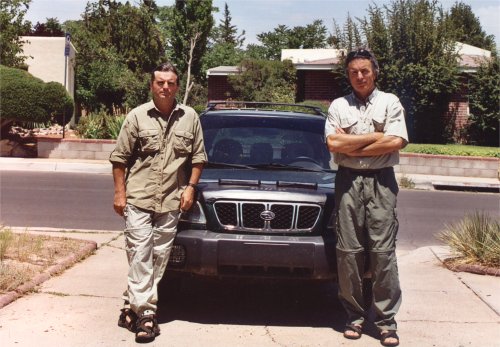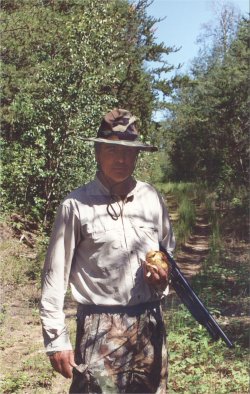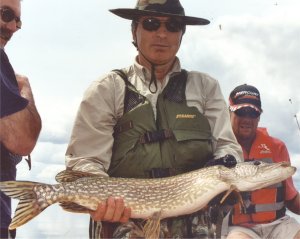
|
« Various topics Chasing Loons … in a Subaru Have you ever heard a loon laugh over a wild, moonlit lake in Saskatchewan? If you have — as I did several years ago near Big River — you are not likely to forget that haunting call of the champion diver of northern lakes. And like me, you may want to drive 2000 miles, if only to hear that bird again. Since my last trip in 1997, I have recovered from a low of my professional and personal life, and decided earlier this year to drive again to the end of the road in Canadian wilderness. I have to be where „there is thunder and the wind shouts back": where loons cry, monster pikes hit red-and-white Dardevles, and Saskatoon berries ripen in gratuitous abundance.  Unlike 1997 — when I drove a subcompact and almost got swept away while fording a stream — this time I have the luxury to choose a new compact SUV. The field is crowded with CRVs, RAV4s, Escapes, and others; but there is really only one vehicle in this category that offers the comfort of a station-wagon-like drive as well as the high clearance of an SUV — Subaru Forester. So I buy a new one from Galles and Davis in Albuquerque in 2002, a decision made easier by the professionalism and courtesy of the dealership's personnel. And this summer, I set out on the road with my brother, Tad, and a lot of camping, fishing, and photographic equipment. To be able to carry all this stuff, I decide to install a hitch haul, rather than, say, hook up a trailer. A Cabela's salesperson I call about the haul warns me that unless diverted, the exhaust fumes will affect the cargo on the haul, which sits on the level of the exhaust pipe. I then email a Subaru representative about an angled pipe to divert the fumes, but am told that no such thing is officially approved. Still, I go ahead with the purchase of the hitch haul, as I badly need extra room to carry a huge, heavy duffel bag and an additional gas tank. (My roof rack is already loaded with other travel paraphernalia.) To protect the duffel bag, I hastily attach an improvised steel plate to the frame of the haul. At Bear Lake, on the border of Utah and Idaho, after we have driven about 800 miles, it happens: We smell smoke. Eager for a quick, cooling dip in this huge cold lake, we just drive through a sand dune to short-cut to the public beach, a maneuver somewhat risky but apparently legal: there are SUVs and trucks all over the beach. The high noon sun beats mercilessly on us; my Subaru's wheels spin in the sand and we stall, but soon the AWD pulls through, no problem, after only a moment's hesitation. And then, that disturbing smell. At first we look at the tires, but although warm, they're not the source of the problem. Then we check out the bag on the haul: it's the rubberized pads that are beginning to smoke. So there! The hitch frame and my protective plate are untouchably hot. The heat of the exhaust fumes combines with the hot summer sun to nearly ignite the cargo. I now remember what the Cabela's guy told me. What to do? We hoist the duffel bag on the car roof and somehow manage to kick in the extra gas tank behind the front passenger's seat: the rear seats are folded and there is no room in the back. No time to customize the protective plate now.
Relieved of the haul — and lighter, taller, and more limber - we press on northbound and cross the border at Monchy, where U.S. customs officials are a little curious about my Mossberg shotgun. The new terrorist alert makes everybody nervous, but I hasten to explain I need my gun in bear and moose country, up in northern Saskatchewan, where we are headed. I then pay fifty Canadian dollars for the privilege of bringing my gun to Canada, and we enter Saskatchewan at last. We have no interest in the treeless flatlands of southern Saskatchewan, so, in what seems like an illegally short time, we gobble up the distance of about 600 kilometers to our first destination, the Delaronde Resort at Delaronde Lake. We are a little heavy on the accelerator: we see no cops, this being Canada's national holiday, and only minor traffic in minor towns. The Subaru's engine seems too willing to respond, and the Forester sails like a luxury sedan across the wheat fields and grasslands of southern Saskatchewan. Only when we occasionally go off the highway for a necessary stop once in a while are we reminded that our comfortable station wagon is also a nimble SUV.
We move on north, and soon put our Subaru to a grueling test by driving on an old, abandoned Doré Lake road. Jim, the outfitter from the Tower Lodge, where we are camping, tells us of the road after I inquire about where to find lots of wild strawberries and maybe also to check out the Subaru's AWD. The old road — whatever, that is, remains of it, as in places it has been almost reclaimed by wilderness — is indeed rough and dangerously muddy. Yet we pull through all those swamps, ruts, and bushes, getting a few unavoidable scratches on the sides of the car and losing only the plastic hitch cover, which my brother somehow recovers from the slime before it is embedded in the dirt forever. Regrettably, we must be heading back south: our time is running out. At Deep Lake, one more time, we hear the loons. The males and females alternate to give us an all-night farewell concert, as if sensing we're leaving. In Bozeman, my brother quickly and ingeniously redesigns the protective sheet, so we can re-use the hitch haul and diminish the mountain of cargo on the top of my car. He suspends the steel sheet about an inch below the frame to allow a layer of air to insulate the cargo. He bends the vertical part of the steel sheet to divert the fumes, and now at last the hitch haul is OK. (Perhaps Tad should work as consultant for Cabela's.) On the way back, after we had driven about 3000 miles, we swing by the Elite Mercedes-Subaru dealership in Saskatoon, on 471 Circle Drive, for an oil change. It's already past 4 p.m., and I am concerned we will not be able to get the service today. But when I explain to Jamie Benson, the service consultant, who we are and where we are from, he indicates we might be in luck. (Apparently, they haven't seen many brothers from New Mexico and Poland driving a Forester and chasing loons in Saskatchewan.)Indeed, the guys from the Elite dealership not only change the oil in a record time of about 20 minutes after we pull in, but also give our Forester another wash, since it is still horribly dirty. As we wait, we talk to Elite's salesperson Jason Blair, whose impressive knowledge of AWD technology must be an instant asset to any Subaru dealership in the world. As we leave Canada, it so happens I find a review of the new Forester XT in the Saskatchewan daily, The Star Phoenix. Dated July 4 and written by Paul Williams (for CanWest News Service), the article is an eloquent tribute to this new, more advanced Forester. Concludes Williams: „The Forester drives like a car, has crumple zones for occupant protection in a crash (unlike truck-based SUVs) and gives considerably better mileage .. than a heavy SUV. The Forester continues to be unique in this category, and its extra power will likely attract new buyers from Subaru." Well, that's exactly my perception, too, although my Forester is not XT. Not yet, anyhow. The last leg of our trip, from Bozeman to Albuquerque (about 1100 miles), we cover in one day. The only thing we have to do — other than just enjoy the drive and the efficient cooling system despite the above-one-hundred temperatures all the way from Saskatoon to Albuquerque — is to wash the car a couple of times to get rid of the mud accumulated inside the rims, a result of our rather carefree, exuberant mud-splashing on Canadian forest roads. (The muck-caked rims cause the wheels to wobble a little and possibly prevent us from getting a speeding ticket at last). Throughout the 3-week and 5000-mile-long trip, we never experienced any problems with my Subaru — its engine always murmuring reassuringly and its ABS engaging predictably and safely whenever we underestimated the slipperiness of muddy roads. And we never lacked power: the 165-horsepower did its job more than just fine. The new Forester XT, with its 210 h.p. and 235 ft-lbs of torque, is undoubtedly an improvement. If so, it may be that the improvement is to some extent superfluous. But who knows? Maybe next time I go listen to loons and pull a few lunkers, I will haul a camper. I am done with hitch hauls, needless to say, and, at my middle age, I may be done with tents as well. So I will need that extra horsepower and torque, after all. Guess what compact SUV I will consider buying next? Kaz Dziamka is editor of the American Rationalist. His brother, who has graduated from a polytechnic and lives in Poland, is a professional photographer and video camera operator.
« Various topics (Published: 12-09-2003 Last change: 06-10-2003)
page 2694 |
|||||||||||||||||||||||||||||||||||||||||||||||||||||||||||||||||||||
| [ Cooperation ] [ Advertise ] [ Map of the site ] [ F.A.Q. ] [ Store ] [ Sign up ] [ Contact ] The Rationalist © Copyright 2000-2018 (English section of Polish Racjonalista.pl) | ||


 In Bozeman, Montana, we leave the haul with my relatives and repack the
car by taking out the rear seats and dumping a few items we have downgraded as
less essential. We have two reasons
to get rid of the hitch haul: the fire hazard and the lowered clearance. The
fact is the hitch haul converts my SUV to a low-riding car. The main bolt on the frame is the lowest point of my
Subaru's underbelly, lower than the exhaust pipe.
It is this bolt that scrapes the pavement when I pull out from my
driveway in Albuquerque. What did I expect would happen when I hit the rough,
treacherous, muddy forest roads of central Saskatchewan?
How could I even consider buying the hitch haul in the first place?
In Bozeman, Montana, we leave the haul with my relatives and repack the
car by taking out the rear seats and dumping a few items we have downgraded as
less essential. We have two reasons
to get rid of the hitch haul: the fire hazard and the lowered clearance. The
fact is the hitch haul converts my SUV to a low-riding car. The main bolt on the frame is the lowest point of my
Subaru's underbelly, lower than the exhaust pipe.
It is this bolt that scrapes the pavement when I pull out from my
driveway in Albuquerque. What did I expect would happen when I hit the rough,
treacherous, muddy forest roads of central Saskatchewan?
How could I even consider buying the hitch haul in the first place?
 At the Delaronde Resort I talk to the new owners and managers: Wayne
Watson and Holly Chow, the successful hunter whose many impressive trophies
testify to her admirable wilderness skills. Somebody local implies that it is
kind of loony to drive 2000 miles to listen to loons, so I clarify that we are
also in search of a lunker pike. Wayne
says simply: „I can take you to a place on the lake where you will catch a 10-15 pound pike." A little short of the lunker size, but good enough for me. I respond, though, by remarking that "once a fisherman, always a liar," but
Wayne calmly repeats what he says. So
the next day, sure enough, I get a ten-pounder.
And so does my brother. And so does Wayne and a friend from Big River.
Between the four of us, we catch about 30 pikes, mostly in the 5-8 pound range,
keeping only a few for ourselves and releasing the rest at that secret spot on
the lake of which only professional guides like Wayne seem to know.
At the Delaronde Resort I talk to the new owners and managers: Wayne
Watson and Holly Chow, the successful hunter whose many impressive trophies
testify to her admirable wilderness skills. Somebody local implies that it is
kind of loony to drive 2000 miles to listen to loons, so I clarify that we are
also in search of a lunker pike. Wayne
says simply: „I can take you to a place on the lake where you will catch a 10-15 pound pike." A little short of the lunker size, but good enough for me. I respond, though, by remarking that "once a fisherman, always a liar," but
Wayne calmly repeats what he says. So
the next day, sure enough, I get a ten-pounder.
And so does my brother. And so does Wayne and a friend from Big River.
Between the four of us, we catch about 30 pikes, mostly in the 5-8 pound range,
keeping only a few for ourselves and releasing the rest at that secret spot on
the lake of which only professional guides like Wayne seem to know.
